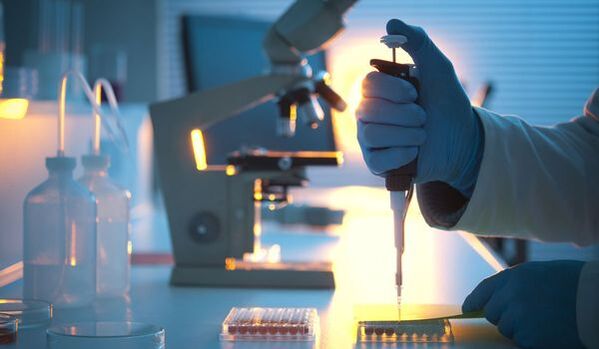Worm infection - parasitic infection of the human body - worms (helminths). Symptoms of a roundworm infestation are determined by the way it is transmitted, the number of parasites received, how well they have adapted to the human body, and other characteristics.
The first signs of the disease in adults can appear both 2-3 days after infection and after a year and a half, but usually the incubation period is 2-3 weeks.
Worms do not tend to multiply in the human body (with the exception of pinworms and some other worms)
Ways of infection:
- contact with the household;
- tonic;
- transmittable;
- through the skin.
The source of infection is a sick person or a carrier.
Classification of worms
In adults, the parasitism of more than two hundred types of helminths has been recorded, which, according to their structural characteristics, belongs mainly to two types of worms:
- Roundworms are roundworms that cause diseases such as roundworms, roundworms, roundworms, roundworms, filariasis, filariasis, and roundworms.
- Flatworms are divided into:
- a class of tapeworms that cause teniarinhoz, tubal infections, tapeworms, filariasis, schistosomiasis, gnathostomiasis;
- a class of flukes that cause schistosomiasis, fascioliasis, fascioliasis, fascioliasis, helminthiasis.
Depending on the characteristics of the life cycle and transmission factors, people distinguish 3 main types of helminths: earthworms, biological worms, and contact helminths.
Effects of parasites on the human body
Most worms live in the intestines of adults, however, some worms parasitize at the larval stage in the tissues of other organs (liver, brain, heart, lungs, eyes, etc. ). During the life of helminths, toxic substances are formed that enter the bloodstream and are carried by it to various organs. In addition, worms in the human intestine absorb substances necessary for life (amino acids, fatty acids, glucose, enzymes and others), which leads to malfunctions in the physiological system of the body.
During pregnancy, the penetration of helminths is doubly dangerous: the adverse effect is reflected not only on the condition of the mother, but also on the maturation of the embryo.
Worm infestation can complicate the development of pregnancy. Due to an infection in a woman's body, the absorption of nutrients is reduced, which is very undesirable during pregnancy.

In addition, helminths during pregnancy can cause severe toxicity. Pinworms can enter a woman's genitals. This leads to severe itching and as a result, constant irritability and sleep disturbances.
There are worms that can damage the intestinal wall. As a result, a small amount of blood may be lost but for a long time. This leads to the formation of iron deficiency anemia in pregnant women.
Helminths have the ability to penetrate the placental barrier and parasitize on the body and in the body of the fetus. Furthermore, they can enter the brain and lead to increased head size, complicating the birthing process.
Their presence in the lungs is also very dangerous - after that, the child will develop chronic inflammation.
Clinic
Distinguish between the acute phase of helminthiasis, which is characterized by a more pronounced nosocomial, and the chronic, which can last several years and manifest with cleared symptoms.
The most common symptoms of a pinworm infestation:
- The appearance of malfunctions in the digestive system, namely:
- constipation (due to intestinal obstruction, biliary tract with worms);
- loose stools (due to the influence of substances produced by helminths);
- gas formation (due to indigestion).
- Joint and muscle pain - occurs when the parasite enters the joint and muscle fluid.
- Skin symptoms (pruritus, eczema, itching, acne) caused by the effects of toxins produced by helminths.
- Nervous system disorders, manifestations:
- worry;
- irritability;
- longing;
- sleep disturbances, etc. v.
- Weight loss associated with metabolic disorders.
- Lethal symptoms of the respiratory tract (runny nose, cough), arising from the penetration of helminths into them.
Indirect signs of helminth infestation:
- enlarged lymph nodes;
- increased body temperature;
- fatigue, weakness;
- nausea (possibly during pregnancy, as a manifestation of intoxication);
- headache;
- anemia (due to blood loss);
- itching in the perineum.
Diagnose
Usually, to detect helminthic infestations in adults, stool analysis or scraping from the folds around the anus is performed. Worm eggs are examined microscopically and their shape is determined.
However, this analysis does not always help identify helminths. The most specific method for helminth infestation is a blood test for the presence of antibodies to different types of worms in it. In a general blood test, when the body is infected with worms, it will detect an elevated level of eosinophils and white blood cells.

To identify worms during pregnancy, analysis alone may not be enough. For a more reliable diagnosis, it is necessary to conduct ultrasound, blood tests and analysis of amniotic fluid.
Therapy
When signs of helminth infestation are detected and the diagnosis is verified using blood and stool tests, treatment is carried out taking into account the type of parasite. For this, the doctor prescribes specific dewormers. Usually, these drugs do not enter the bloodstream, only working inside the intestines. Because of this, the possibility of toxic effects on the body is very small.
In some cases, a single application of the drug is enough to get rid of the worms, in other cases a longer course of treatment, developed according to the specialist's own regimen.
This is a prerequisite for the disease not to progress to chronic. The main task of repeated treatment is to destroy the parasites that have entered the human body in the form of eggs and have not completed their developmental life. After a while, they will turn into adults and will be destroyed under the effect of the drug.
Usually, to achieve a good result, the whole family should be treated under the control of blood and stool tests.
Disease genetic therapy includes antiallergic drugs, drugs to normalize the intestinal microflora.
At the same time, concomitant diseases are treated, which often develop as a complication of helminthiasis (anemia, anemia, malnutrition).
During pregnancy, in addition to the anthelmintic effect of the drug, the drug can affect the fetus.
As a rule, in the first trimester of pregnancy, when the laying of the main organs and systems of the embryo is in the formative stage, it is better to avoid such treatment. During this period, any medication can do more harm to the fetus than the possible risk from exposure to the worms.

At this stage, you can try to get rid of the parasites with the help of non-drug means.
Many formulations are known that can complement the basic treatment, and sometimes completely replace drug therapy. The most proven means of helminths are:
- Pumpkin seeds;
- onion;
- garlic;
- pomegranate juice;
- powdered wormwood.
During the second and third trimesters, the possibility of negative effects of the drug on the fetus and the possibility of pregnancy is reduced.
After the end of the course, it is necessary to re-analyze to find worms - helminths. This is done to ensure that the treatment prescribed is correct and that all worms are destroyed.
It must be remembered that therapy should be carried out under the supervision of a specialist. Repeat analysis was performed no earlier than 2 weeks after the end of the course of treatment. The course of treatment can be considered completed with 3 negative tests with an interval of 2 weeks.
Prevent
Measures to prevent worms:
- Observe personal hygiene measures (wash hands before eating, personal use
- personal hygiene products, personal underwear and bed linen);
- compulsory washing with water of vegetables, fruits and green vegetables before eating;
- complete heat treatment for meat and fish;
- against blood-sucking insects;
- regular wet mopping in the house;
- adequate care for pets;
- regularly change underwear and bed linen, with mandatory ironing;
- Exclude swimming in waters with a high likelihood of helminth infections.
When planning a pregnancy, you should see a doctor to look for worms. If so, it is necessary to treat it before pregnancy, so as not to harm the child's body.
Timely and definitive treatment of the acute form of helminthiasis is to prevent the chronic course of the disease.






































